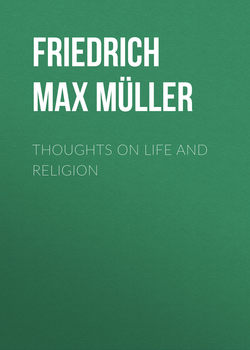Thoughts on Life and Religion

Реклама. ООО «ЛитРес», ИНН: 7719571260.
Оглавление
Friedrich Max Müller. Thoughts on Life and Religion
PREFACE
THE ART OF LIFE
THE BEAUTIFUL
THE BIBLE
CHILDREN
CHRIST, THE LOGOS
CHRISTIANITY
DEATH
THE DEITY
THE DIVINE
DOUBTS
EVOLUTION OF RELIGION
FAITH
THE FATHERHOOD OF GOD
FUTURE LIFE
THE INFINITE
KNOWLEDGE
LANGUAGE
LIFE
LOVE
MANKIND
MIND OR THOUGHT
MIRACLES
MUSIC
NATURE
OBSCURITY
OLD AGE
RELIGION AND RELIGIONS
REVELATION
THE RIG-VEDA
SCIENCE
THE SELF
SORROW AND SUFFERING
THE SOUL
THEOSOPHY
TRUTH
THE WILL OF GOD
WONDER
WORDS
WORK
THE WORLD
Отрывок из книги
To learn to understand one another is the great art of life, and to 'agree to differ' is the best lesson of the comparative science of religion.
There is a higher kind of music which we all have to learn, if our life is to be harmonious, beautiful, and useful. There are certain intervals between the young and the old which must be there, which are meant to be there, without which life would be monotonous; but out of these intervals and varieties the true art of life knows how to build up perfect harmonies.... Even great sorrow may be a blessing, by drawing some of our affections away from this life to a better life … of which, it is true, we know nothing, but from which, when we see the wisdom and love that underlie this life, we may hope everything. We are meant to hope and to trust, and that is often much harder than to see and to know.... The greatest of all arts is the art of life, and the best of all music the harmony of spirits. There are many little rules to be learnt for giving harmony and melody to our life, but the thorough bass must be—love.
.....
Christ has been made so unreal to us, He has been spoken of in such unmeasured terms that it is very difficult to gain Him back, such as He was, without a fear of showing less reverence and love of Him than others. And yet, unreal expressions are always false expressions—nothing is so bad as if we do not fully mean what we say. Of course we know Christ through His friends only, they tell us what He told them—they represent Him as He appeared to them. What fallible judges they often were they do not disguise, and that, no doubt, raises the value of their testimony, but we can only see Him as they saw Him; the fact remains we know very little of Him. Still, enough remains to show that Christ was full of love, that He loved not only His friends, but His enemies. Christ's whole life seems to have been one of love, not of coldness. He perceived our common brotherhood, and what it was based on, our common Father beyond this world, in heaven, as He said.
We must never forget that it was not the principal object of Christ's teaching to make others believe that He only was divine, immortal, or the son of God. He wished them to believe this for their own sake, for their own regeneration. 'As many as received Him to them gave He power to become the sons of God.' It might be thought, at first, that this recognition of a Divine element in man must necessarily lower the conception of the Divine. And so it does in one sense. It brings God nearer to us, it bridges over the abyss by which the Divine and the human were completely separated in the Jewish, and likewise in many of the pagan religions. It rends the veil of the temple. This lowering, therefore, is no real lowering of the Divine. It is an expanding of the concept of the Divine, and at the same time a raising of the concept of humanity, or rather a restoration of what is called human to its true character,—a regeneration, or a second birth, as it is called by Christ Himself. 'Except a man be born again, he cannot see the kingdom of God.'
.....